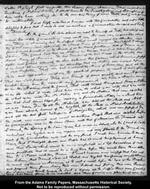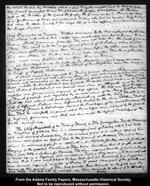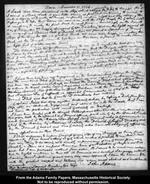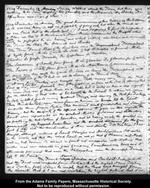Peace December 11. 1779
A Leak was soon discovered in the Ship, which obliged Us to ply the Pumps. As it seemed a steady Leak, it gave little Alarm at first: but continuing to increase, to such a degree, as to make two Pumps, incessantly necessary night and day, obliging the Passengers to take their turns in common with the Ships People, the Captain judged it necessary to make the first Port he could find.... Accordingly on the Seventh day of December, We happily discovered Cape Finisterre, and on the Eighth arrived at the magnificent Spanish Port of Ferrol, where We found a Squadron of French Ships of the Line, the Officers of which think We were very happy in making this Port, as the Frigate, since she has been in Harbour, is found to make Seven or Eight feet of Water in an hour.
The Advice of all the Gentlemen here to me is to make the best of my Way to Paris by Land: As it is the Opinion of many that the Frigate will be condemned. But if not, she certainly will not be ready to sail again from this Port, in less than four or five Weeks. This is unfortunate to me, because by all the information I can obtain, Travelling in this Kingdom is attended with many difficulties and delays, as well as very great expence, there being no regular Posts as in France and no possibility of passing over the mountainous parts of this Country in Carriages.
I find there has been no Engagement in the European Seas, between the English and the combined Fleets of France and Spain, as was reported in America. There has been an epidemic Sickness, on board the French Fleet, which obliged them to return to Brest rather sooner than was intended. There are twenty five Ships of the Line Spanish Ships of the Line in Brest Harbour with the French. It is reported that Monsieur Du Chaffault is appointed Commander in Chief of the Fleet French Fleet and that the Comte D'Orvilliere has retired.
Captain Jones has done another brilliant Action, by taking a Forty four Gun Ship, after an obstinate Engagement, and carried her into the Texell. But I cannot learn the particulars with much Certainty or Exactness.
I have been treated with the utmost Politeness and Attention since my Arrival in this place, both by the Spanish and French Officers, particularly by the Spanish Lieutenant General of the Marine, Don Joseph Saint Vincent, who is Commander in Chief of the Marine, by Monsieur De Sade, the French Chef D'Escadre, and by the French Consul and Vice Consul, who have all obligingly offered me every Assistance in their Power.
I shall endeavour to inform Congress of every Step of my Progress, as I may find Opportunity. I have heard nothing as yet, which makes it probable to me, that I shall have any Thing to do openly and directly, in pursuance of my Commission, very speedily. There is a confused Rumour here of a Mediation of Russia and Holland: but I am persuaded without foundation. It seems to be much more certain that the English continue in their old ill Humour and insolent Language, notwithstanding their Impotence grows every day more apparent. I have the honour to be with the greatest respect and Esteem, Sir your most obedient and most humble Servant
John Adams.
His Excellency Samuel Huntington Esqr. President of Congress.
1779 December 12 Monday Sunday
Walked about the Town, but there was nothing to be seen, excepting two Churches, and the Arsenals, dry Docks, Fortifications and Ships of War.
1779 December 13. Monday.
The great Inconvenience of this Harbour is, the Entrance is so narrow, there is not no possibility of going out, but when the Wind is in one Point, that is the South East.... I was surprized to find so important a Place as this is to the Spanish Naval Power, surrounded by Heights which might easily be possessed by an Enemy, and which entirely overlooked and commanded the Town, the Ships, the Arsenals and Docks.
The Three French Ships of the Line here were the Tryumphant Triomphant of Eighty Guns, M. Le Comte De Sade Chef D'Escadre or General, M. Le Chevalier de Grasse Preville, the Capitaine de Pavillon.
The Souverain of Seventy four Guns, M. Le Chevalier De Glandevesse Captain
The Jason of Sixty four Guns, M. de La Marthonie, Commander.
We dined one day with the Comte De Sade on Board the Triomphant, with all the principal Officers of the Fleet in all the Luxury of the French Navy.
A very fine Turkey was brought upon Table, among every Thing else that Land or Sea or Air could furnish. One of the Captains, as soon as he saw it, observed that he never saw one of those Birds on a Table but it excited in him a deep regret for the Abolition of that order of Ecclesiasticks the Jesuits to whom We were he said, indebted for so many Excellent Things, and among the Rest for Turkeys. These Birds he said were never seen or known in Europe till the Jesuits imported them from India. This occasioned much Conversation and some Controversy: but the majority of the Officers appeared to join in this regrett. The Jesuits were represented as the greatest Masters of Science and Litterature: as practising the best System of Education, and as having made the greatest improvements, the happiest Inventions and the greatest discoveries for the Comfort of Life and the Amelioration of Man and Society. Till this time I had thought that although millions of Jesuits, Pharisees and Machiavilians still existed in the World, yet that the Word Jesuit as well as that of Pharisee and Machiavilian, had become so odious in Courts and unpopular with Nations that neither was ever advocated in good Company. I now found my Error, and I afterwards perceived that even the Philosophers were the principal Friends left to the Jesuits.
The French
Words Names Dindon and Poulet D'Inde, indicate that the Fowl was imported from India: But the English Name Turkey and Turkey fowl, seems to imply that the Bird was brought from the Levant. But if I am not mistaken, the English pretend that Sir
Page 3
Walter Raleigh first imported this Luxury from America. These important Questions of Natural History I shall leave to the Investigation and Discussion of those who have nothing else to do, nor
any thing of more Taste and Consequence to contemplate.
I was highly entertained however with this Conversation and not a little delighted to find that I could so well understand a Conversation so rapid and lively in French.
As the Count De Sade placed me next to himself at Table, his chief and indeed his whole Conversation was with me. He was very inquisitive about
every Thing in America, but the Subject which most engaged his Attention was the Commerce and especially the Naval Power of America. This Subject I always found most prevalent in the Minds of all the Naval Gentlemen both of France and Spain. The Count said that no Nation in Europe had such Advantages for Naval Power as America. We had Timber of the best Kinds in the World, our Oaks and Cedars especially the Live Oaks and Red Cdars, which America Possessed in such Abundance, were an Advantage that no Nation ever enjoyed before in such Perfection. That We had inexhaustible Mines of Iron
Oar and all the Skill and Apparatus necessary to
work it prepare it, work it and refine it. That our Soil produced Flax and Hemp of good quality, and our Agriculturalists knew how to raise it and preserve it. We have a Maxim among Us in the Marine, said the Count, That with Wood, Hemp and Iron, a Nation may do what it will. And you may do what you will, and you will do what you will. For No Nation has, and No Nation that ever existed ever had such Advantages for raising a formidable Navy in a short time as you have. For to all the Materials you add all the Skill and Art. You have already learned of the English, all the Skill in Naval Architecture and all the Art and Enterprise of Navigation, which was ever possessed by the most commercial and most maritime People that ever existed. In fine his Conversation was in the same Strain with that of Monsieur De Thevenot
[Thevenard] at L'Orient, in the Spring of the same Year, but more in detail. As the Count de Sade understood no English and my organs were not very flexible to the French, my part of the Conversation could not be very fluent. I made him however to understand, that I thought
it w our People had so much Employment at home upon their Lands, which would be more comfortable and less hazardous if not more profitable that it would be a long time before they would turn their Attention to a Naval military Power. I must however now confess that I did not then believe that French, Spanish, Dutch and English Emissaries, would obtain so much influence in America as to cast a mist before the Eyes of the People and prevent them from seeing their own Interest and feeling their own Power for seven and twenty Years, to such a degree as to suffer their own Coasts and
harbours to be insulted and their Commerce plundered even in
Page 4
the West Indies by Pirates, which a few Frigates might send to their
[own] place. The Count presented to me The Chevalier De Grasse, as his Captaine De Pavillon and as the Brother of the Count de Grasse, the Commander in America, and as a Gentleman of large and independent Fortune, who had no Occasion to go to Sea but chose to expose himself to the rough Life of a Sea Officer, from pure Zeal for the Kings Service.
1779 December 14. Tuesday.
Walked once more to the Barracks and dry Docks. The Stones with which these Works were constructed, were far inferiour to our Quincy North Common Granite. They were not better than the South Common Stone. We went into the magnificent Church of St. Julien, where We saw Numbers of Devotees upon their Knees, some before the Altar and some before one Statue or Picture and some before another. This kind of Devotion was much more fashionable in Spain than in France.
We had lodged en la Calle de La Madalena, junto coca, en casa de Pepala Botoneca, i.e. in the Street of the Magdalen near the head, in the House of Pepala Botoneca.
I spent several Evenings with the French Consul Monsieur Detournelle, whom I found a well bred and well informed Man. He was well read, and had been conversant with the Writers on the Law of Nations, particularly in the Titles of those Laws relative to Ambassadors and Consuls. He quoted several Writers on the Rights and Duties of Ambassadors and Consuls and some on Ettiquette and the Formalities and Ceremonies required of those Offices. He told me that the Office of French Consuls was regulated by an ordinance of the King, but that some Nations had entered into particular Stipulations with the King. That the Consuls of different Nations were differently treated by the same Nation. That as Consul of France he had always claimed the Priviledges of the most favoured Nation. That he carefully enquired what Priviledges were enjoyed by the Consuls of England, Germany and Italy and demanded the highest Priviledges of the Gentis amicissim.
The Chief Magistrate of the Town of Ferrol, is The Corregidor. For the Province or Kingdom of Gallicia, there is a Souvereign Court of Justice, which has both civil and criminal Jurisdiction. In all criminal Cases it is without Appeal, but in some civil Cases an Appeal lies to the Council at Madrid. There is no time allowed in criminal Cases for an Application for Pardon, for they execute forthwith. Hanging is the Capital Punishment. They burn sometimes but it is after death. There was lately a Sentence for Parricide. The Law required that the Criminal should be headed up in a hogshead, with an Adder, a Toad, a Dog and a Cat and cast into the Sea. But I was much pleased to hear that Spanish humanity had suggested and Spanish Ingenuity invented a Device to avoid some part of the Cruelty and horror of this punishment. They had painted those Animals on the Cask, and the dead body was put into it, without any living Animals to attend it to its watery Grave.




